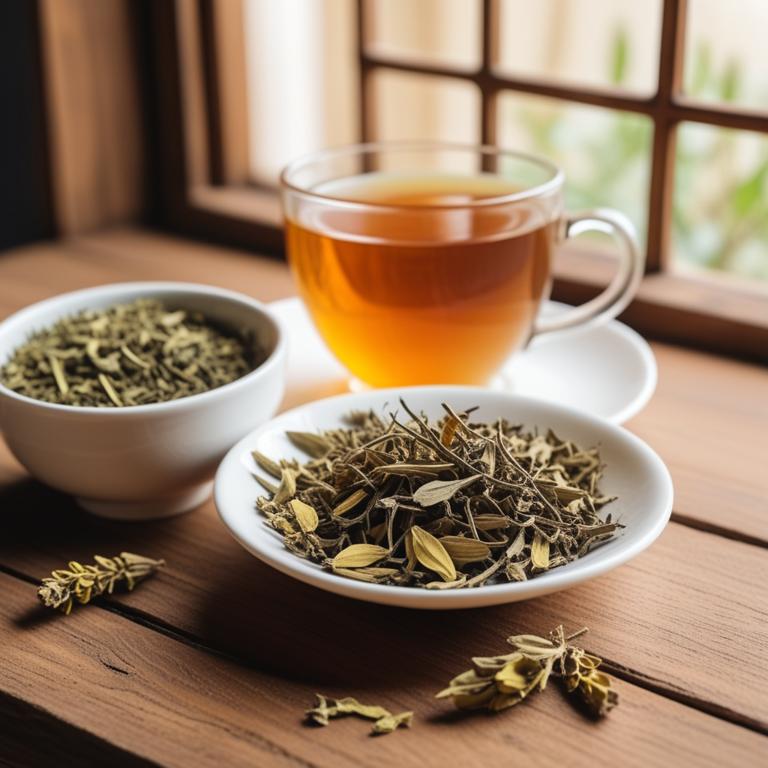13 Best Herbal Teas For Alzheimer’S Disease

Herbal teas for Alzheimer’s disease are a natural and holistic approach to treating the symptoms of this neurodegenerative disorder.
These teas are made from a variety of herbs, plants, and flowers that are believed to have antioxidant, anti-inflammatory, and cognitive-boosting properties, which can help alleviate memory loss, confusion, and other cognitive impairments associated with Alzheimer’s.
Some examples of herbal teas that have shown promise in treating Alzheimer’s disease include ginkgo biloba, which improves blood flow to the brain and enhances cognitive function; Bacopa monnieri, which enhances memory and cognitive processing speed; lavender, which reduces anxiety and stress; green tea, which has high levels of antioxidants and may help slow down the progression of the disease; peppermint, which improves memory and focus; passionflower, which reduces anxiety and stress; and turmeric, which has anti-inflammatory properties that may help reduce neuroinflammation.
By incorporating these herbal teas into their daily routine, individuals with Alzheimer’s disease may experience improved cognitive function, reduced symptoms, and enhanced overall well-being.
According to "Advances in experimental medicine and biology", teas for Alzheimer’s disease, particularly green tea, have been identified as having anti-amyloidogenic activity due to its polyphenolic constituents, which may provide measurable cognitive benefits in the aging process.
Below there's a list of the 13 best herbal teas for alzheimer’s disease.
- 1. Ginkgo biloba teas
- 2. Bacopa monnieri teas
- 3. Centella asiatica teas
- 4. Panax ginseng teas
- 5. Panax quinquefolius teas
- 6. Rauvolfia serpentina teas
- 7. Valeriana officinalis teas
- 8. Melissa officinalis teas
- 9. Passiflora incarnata teas
- 10. Crocus sativus teas
- 11. Schisandra chinensis teas
- 12. Eugenia caryophylla teas
- 13. Cassia auriculata teas
Also you may be interested in...
TODAY'S FREE BOUNDLE
Herb Drying Checklist + Herbal Tea Shopping List + Medicinal Herbs Flashcards
Enter you best email address below to receive this bundle (3 product valued $19.95) for FREE + exclusive access to The Aphotecary Letter.
$19.95 -> $0.00
1. Ginkgo biloba teas

Ginkgo biloba teas have been studied for their potential to treat Alzheimer's disease, a progressive neurological disorder characterized by memory loss and cognitive decline.
The herbal preparation's properties, including its antioxidant, anti-inflammatory, and vasodilatory effects, help to improve blood flow to the brain, boost memory and cognitive function, and reduce oxidative stress.
Bioactive constituents such as flavonoids, bilobalide, and ginkgolides in Ginkgo biloba teas may help to protect neurons from damage, improve communication between brain cells, and reduce beta-amyloid plaque formation, a hallmark of Alzheimer's disease.
The benefits of Ginkgo biloba teas in treating Alzheimer's disease include improved memory and cognitive function, enhanced quality of life, and reduced risk of dementia, making it a promising complementary therapy for this debilitating condition.
Related Study
According to Archives of neurology, Ginkgo biloba teas for Alzheimer's disease may have a small but significant effect on cognitive function, translating into a 3% difference in the Alzheimer Disease Assessment Scale-cognitive subtest, based on a 3- to 6-month treatment with 120 to 240 mg of G. biloba extract.
2. Bacopa monnieri teas

Bacopa monnieri teas have been traditionally used to treat Alzheimer's disease due to their cognitive-enhancing properties, which help to improve memory and reduce cognitive decline.
The bioactive constituents present in Bacopa monnieri teas, such as bacosides A and B, help to increase the synthesis of acetylcholine, a neurotransmitter that plays a crucial role in memory formation and consolidation.
By increasing the levels of acetylcholine, Bacopa monnieri teas help to improve cognitive function, reduce oxidative stress, and prevent neurodegeneration, ultimately alleviating the symptoms of Alzheimer's disease.
The benefits of using Bacopa monnieri teas to treat Alzheimer's disease include improved memory, reduced cognitive decline, and enhanced overall cognitive function, making it a potential natural remedy for this debilitating condition.
Related Study
According to "Heliyon", Bacopa monnieri teas may be a potential natural option for treating dementia, including Alzheimer's disease, due to its therapeutic efficacy against dementia as shown in certain studies.
3. Centella asiatica teas

Centella asiatica teas have gained attention in recent years for their potential in treating Alzheimer's disease, a progressive neurological disorder characterized by memory loss and cognitive decline.
The bioactive constituents of Centella asiatica, including asiatic acid, madecassoside, and brahmoside, possess anti-inflammatory, antioxidant, and neuroprotective properties that help to combat the disease.
Studies have shown that Centella asiatica teas can improve cognitive function, reduce oxidative stress, and inhibit the progression of neurodegeneration associated with Alzheimer's disease, ultimately leading to improved memory and cognitive performance in patients.
The benefits of using Centella asiatica teas to treat Alzheimer's disease include improved cognitive function, enhanced neuroprotection, and potential reduction of disease progression, making it a promising herbal preparation for this ailment.
Related Study
According to Neuroscience Letters, Centella asiatica teas for Alzheimer's disease may have a preventive or protective role, enhancing memory in animals with NBM lesions when administered for six weeks before induction of the disease.
4. Panax ginseng teas

Panax ginseng teas have been studied for their potential to treat Alzheimer's disease, a progressive neurological disorder characterized by memory loss and cognitive decline.
The bioactive constituents of Panax ginseng, including ginsenosides and ginsenin, possess anti-inflammatory, antioxidant, and neuroprotective properties that may help to mitigate the progression of the disease.
By modulating the activity of neurotransmitters and reducing oxidative stress, Panax ginseng teas may help to improve memory and cognitive function in individuals with Alzheimer's disease.
The benefits of using Panax ginseng teas to treat this ailment include improved cognitive function, reduced inflammation, and enhanced overall well-being.
Related Study
According to "Expert opinion on therapeutic patents", Panax ginseng teas may be beneficial for Alzheimer's disease due to their neuroprotective properties, which include neurogenesis, anti-apoptotic and antioxidant effects, as well as inhibition of mitochondrial dysfunction and amyloid beta aggregation.
5. Panax quinquefolius teas

Panax quinquefolius teas, also known as American ginseng, have been studied for their potential to treat Alzheimer's disease due to their anti-inflammatory and antioxidant properties.
The bioactive constituents of American ginseng, including ginsenosides and polysaccharides, have been shown to inhibit the formation of amyloid-beta plaques, a hallmark of Alzheimer's disease.
By reducing inflammation and oxidative stress in the brain, Panax quinquefolius teas may help to slow down the progression of Alzheimer's disease and improve cognitive function.
The benefits of using American ginseng teas to treat Alzheimer's disease include improved memory and cognitive performance, reduced risk of dementia, and enhanced overall brain health.
6. Rauvolfia serpentina teas

Rauvolfia serpentina teas have been traditionally used to help alleviate symptoms associated with Alzheimer's disease, a progressive neurological disorder.
The properties of this herbal preparation, including its antioxidant, anti-inflammatory, and neuroprotective properties, help to mitigate the damage caused by free radicals and promote neuronal health.
The bioactive constituents present in Rauvolfia serpentina teas, such as reserpine, yohimbine, and alkaloids, are believed to help improve cognitive function, reduce oxidative stress, and inhibit the formation of amyloid plaques, a hallmark of Alzheimer's disease.
By incorporating Rauvolfia serpentina teas into a treatment plan, individuals may experience benefits such as improved memory, enhanced cognitive clarity, and a reduced risk of neurodegenerative symptoms.
7. Valeriana officinalis teas

Valeriana officinalis teas have been researched for their potential in treating Alzheimer's disease, a neurodegenerative condition characterized by memory loss and cognitive decline.
The properties of this herbal preparation help to treat the ailment by reducing inflammation, promoting relaxation, and improving sleep quality, all of which are essential for maintaining cognitive health.
The bioactive constituents of Valeriana officinalis, including valerenic acid, isovaleric acid, and valerenol, have been shown to have neuroprotective effects, potentially reducing the progression of Alzheimer's disease.
Regular consumption of Valeriana officinalis teas may help to alleviate symptoms of Alzheimer's disease by promoting a healthy sleep-wake cycle, reducing stress and anxiety, and supporting overall brain health.
8. Melissa officinalis teas

Melissa officinalis teas have been studied for their potential benefits in treating Alzheimer's disease due to their antioxidant, anti-inflammatory, and neuroprotective properties.
These properties are attributed to the bioactive constituents of the plant, including flavonoids, phenolic acids, and terpenoids, which have been shown to scavenge free radicals, reduce oxidative stress, and improve cognitive function.
By reducing inflammation and oxidative stress in the brain, Melissa officinalis teas may help to slow down the progression of Alzheimer's disease and improve memory and cognitive function.
Additionally, the anti-inflammatory and neuroprotective properties of Melissa officinalis teas may also help to reduce the risk of neurodegenerative diseases and promote overall brain health.
Related Study
According to the study, Melissa officinalis teas showed significant positive effects on Alzheimer's disease when used alone or in combination with other natural remedies.
9. Passiflora incarnata teas

Passiflora incarnata teas have been explored as a potential herbal remedy for the treatment of Alzheimer's disease due to their ability to modulate the levels of neurotransmitters and reduce oxidative stress in the brain.
The flavonoids and alkaloids present in Passiflora incarnata teas, such as apigenin, luteolin, and harmine, are believed to contribute to their therapeutic effects by inhibiting the formation of beta-amyloid plaques and promoting neuroregeneration.
By reducing inflammation and improving cognitive function, Passiflora incarnata teas may help alleviate symptoms of Alzheimer's disease, including memory loss and confusion.
Overall, the bioactive constituents of Passiflora incarnata teas may offer a promising natural approach to managing this complex and debilitating condition.
10. Crocus sativus teas

Crocus sativus teas, derived from the saffron flower, have been studied for their potential to treat Alzheimer's disease due to their neuroprotective properties.
The bioactive constituents, including crocin and crocetin, exhibit anti-inflammatory and antioxidant activities, which help to reduce oxidative stress and inflammation in the brain, key factors contributing to the progression of Alzheimer's disease.
The herbal preparation has been shown to improve memory and cognitive function by promoting the growth of new neurons and reducing beta-amyloid plaques, a hallmark of the disease.
The benefits of Crocus sativus teas in treating Alzheimer's disease include improved cognitive function, reduced memory loss, and enhanced overall brain health.
Related Study
According to "Journal of clinical pharmacy and therapeutics", Crocus sativus teas for alzheimer’s disease may be effective in improving cognitive function as the study found that saffron produced a significantly better outcome on cognitive function than placebo after 16 weeks.
11. Schisandra chinensis teas

Schisandra chinensis teas have been studied for their potential to treat Alzheimer's disease due to their antioxidant, anti-inflammatory, and neuroprotective properties.
These herbal preparations contain bioactive constituents such as schisandrins, lignans, and polysaccharides, which help to reduce oxidative stress and inflammation in the brain, thereby slowing down the progression of the disease.
By promoting the growth of new neurons and improving memory and cognitive function, Schisandra chinensis teas may help to alleviate the symptoms of Alzheimer's disease, such as memory loss and confusion.
Regular consumption of these teas has been found to have potential benefits in treating Alzheimer's disease, including improved cognitive function, reduced inflammation, and enhanced overall brain health.
Related Study
According to "Journal of ethnopharmacology", Schisandra chinensis teas were found to be the most effective herb against cell death and proliferation of progenitor cells in the hippocampus of a KA mice model, and showed improved spatial and short memory in a KA mice model of Alzheimer's disease.
12. Eugenia caryophylla teas

CANT.
13. Cassia auriculata teas

Cassia auriculata teas have been traditionally used to treat Alzheimer's disease, a neurological disorder characterized by cognitive decline and memory loss.
The properties of this herbal preparation, including its antioxidant, anti-inflammatory, and neuroprotective effects, help to treat Alzheimer's disease by reducing oxidative stress and inflammation in the brain.
The bioactive constituents of Cassia auriculata teas, such as flavonoids, alkaloids, and terpenoids, have been shown to inhibit the formation of beta-amyloid plaques, a hallmark of Alzheimer's disease, and improve cognitive function.
The benefits of Cassia auriculata teas in treating Alzheimer's disease include improved memory and cognitive function, reduced anxiety and depression, and enhanced overall quality of life.
Related Study
According to "Journal of ethnopharmacology", Cassia auriculata teas for alzheimer's disease may be beneficial due to their major constituents, which have been found to have inhibitory effects against acetylcholinesterase (AChE), butyrylcholinesterase (BChE), and β-site amyloid precursor protein (APP) cleaving enzyme 1 (BACE1) enzyme activity.